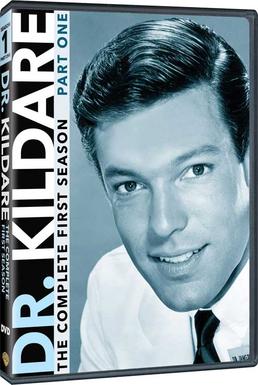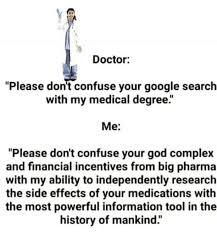
- Written:
- Author: Edward
- Posted in: News
- Tags: dr google, dr kildare, due diligence, exosomes, god complex, physician morale
In the bad old days, doctors used to think nothing of describing patients as “difficult” or “attractive”, even in charts. My how the pendulum has swung. Perhaps due to the clear lack of integrity shown by most during the pandemic years, we are at all an all-time low in physician morale and respect given to and shown by our patients.
When a patient did their own research and would bring us concerns from the internet, we would call it consulting “Dr. Google” and dismiss it with derision.
"Do your own research"
There are some rare conditions where a clear path is dictated by circumstance and the patients’s may be unreasonably risking themselves by not taking medical advice. Those are few and far between. The truth is that especially in chronic disease, the optimal course is often quite subject to debate. It is frankly the doctor’s own insecurities that often lead them to reject ideas that patients come in with after doing their own research.
For example a person suffering from a condition may have done hundreds of hours of research and talked to other persons, but the sum total of a doctor’s knowledge might amount to just a few simple dogmatic statements.
We honestly had to learn so much that we probably only received a few hours of nutritional education and zero information about meditation and breathwork.
Is is a "God Complex" or just insecurity?

People often are taken aback by my willingness to admit when I don’t understand something. I am fortunate to constantly be learning from patients who have much more knowledge and experience than I do.
Sadly, no physician can be an expert at everything so we intentionally call it “practicing” and not “mastering” medicine. Every time I do a complex procedure, I review the anatomy and every time a person has a condition that I haven’t treated, I look it up.
Unfortunately, most doctors hate to admit they don’t know something so they just “wing it”. I had a patient tell me today her doctors advised against exosomes because they were like hyaluronic acid, or because they contained lidocaine; these doctors clearly didn’t do any due diligence before making up things concerning a regimen that has been used to treat long Covid at Yale.
https://www.rechargebiomedical.com/long-covid-and-exosomes/
Despite knowing the exosome treatment relieved a 92yo patient with the same polyarthritis after a mRNA spike shot, the patient chose to blindly follow her doctors instead of learn more about the option of exosomes.
Dr. Kildare has become "Dr. Darekill"
I think it is really sad that the profession that once stood as the sacrosanct last hope for patients is now, perhaps rightfully, viewed as a technical job that could be done by anyone or even by an artificial intelligence.
Unfortunately, patients don’t often know or understand physiology as well as we do, and they don’t always know which symptoms are associated with which conditions. An AI doesn’t know intuitively when a patient is exaggerating, misattributing, or downright confabulating but as long as the risk of malpractice falls elsewhere, the health system will march on.
When the American College of Ob-GYN accepted just $6M dollars to advocate for untested mRNA vaccines in pregnant women, I knew the profession had fallen.
I’ll never forget my best friend’s father, cured of a brain cancer for at least a year after taking TA-65, was refused life-saving prostate surgery despite the neurosurgeon showing the urologist repeated clear brain scans. The bottom line: he would rather be right and have the patient die that to admit he was being unreasonable.
You are the quarterback
There may be blind spots in your knowledge so it is important to listen to doctors when they give you advice. But even though I used to dislike the phrase “I know my body” in patients who didn’t even understand their menstrual cycles, there certainly is no one who is as invested in getting good care as you are. You absolutely have the right and the responsibility to participate in your treatment plans and if you simply abrogate your decisions to someone you trust, you take a big risk. Having said that, find a doctor who can admit what they don’t know and when you present your concerns, listen carefully.

